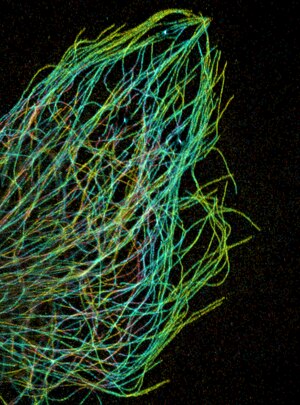Microtubule
File:MicrotubuleDynamicInstability.ogv
== Microtubule ==
Microtubules are cytoskeletal structures found in the cytoplasm of eukaryotic cells. They are composed of tubulin proteins and play a crucial role in maintaining cell shape, enabling cellular motility, and facilitating intracellular transport. Microtubules are also essential for cell division, particularly during the processes of mitosis and meiosis.
Structure
Microtubules are cylindrical tubes with an outer diameter of approximately 25 nanometers and an inner diameter of about 15 nanometers. They are composed of alpha-tubulin and beta-tubulin dimers that polymerize to form a hollow tube. The polymerization and depolymerization of tubulin dimers are dynamic processes regulated by GTP hydrolysis.
Functions
Microtubules serve several critical functions within the cell:
- Cell Shape and Support: They provide structural support to the cell, helping to maintain its shape.
- Intracellular Transport: Microtubules act as tracks for the movement of organelles and vesicles within the cell, facilitated by motor proteins such as kinesin and dynein.
- Cell Division: During mitosis and meiosis, microtubules form the mitotic spindle, which is essential for the segregation of chromosomes into daughter cells.
- Cell Motility: Microtubules are components of cilia and flagella, which are involved in cell movement and fluid flow across cell surfaces.
Dynamics
Microtubules exhibit dynamic instability, characterized by phases of growth and shrinkage. This dynamic behavior is crucial for their functions, particularly in cell division and intracellular transport. The regulation of microtubule dynamics is influenced by various microtubule-associated proteins (MAPs) and post-translational modifications of tubulin.
Microtubule-Associated Proteins (MAPs)
MAPs are proteins that interact with microtubules to regulate their stability and function. Some well-known MAPs include:
- Tau protein: Associated with neurodegenerative diseases such as Alzheimer's disease.
- MAP2: Found in neurons and involved in stabilizing microtubules in dendrites.
- MAP4: Ubiquitously expressed and involved in stabilizing microtubules in various cell types.
Clinical Significance
Microtubules are targets for several anticancer drugs, such as taxanes and vinca alkaloids, which disrupt microtubule dynamics and inhibit cell division. Abnormalities in microtubule function are also implicated in various diseases, including neurodegenerative disorders and cancer.
See Also
This article is a cell biology stub. You can help WikiMD by expanding it!
Transform your life with W8MD's budget GLP-1 injections from $125.
W8MD offers a medical weight loss program to lose weight in Philadelphia. Our physician-supervised medical weight loss provides:
- Most insurances accepted or discounted self-pay rates. We will obtain insurance prior authorizations if needed.
- Generic GLP1 weight loss injections from $125 for the starting dose.
- Also offer prescription weight loss medications including Phentermine, Qsymia, Diethylpropion, Contrave etc.
NYC weight loss doctor appointments
Start your NYC weight loss journey today at our NYC medical weight loss and Philadelphia medical weight loss clinics.
- Call 718-946-5500 to lose weight in NYC or for medical weight loss in Philadelphia 215-676-2334.
- Tags:NYC medical weight loss, Philadelphia lose weight Zepbound NYC, Budget GLP1 weight loss injections, Wegovy Philadelphia, Wegovy NYC, Philadelphia medical weight loss, Brookly weight loss and Wegovy NYC
|
WikiMD's Wellness Encyclopedia |
| Let Food Be Thy Medicine Medicine Thy Food - Hippocrates |
Medical Disclaimer: WikiMD is not a substitute for professional medical advice. The information on WikiMD is provided as an information resource only, may be incorrect, outdated or misleading, and is not to be used or relied on for any diagnostic or treatment purposes. Please consult your health care provider before making any healthcare decisions or for guidance about a specific medical condition. WikiMD expressly disclaims responsibility, and shall have no liability, for any damages, loss, injury, or liability whatsoever suffered as a result of your reliance on the information contained in this site. By visiting this site you agree to the foregoing terms and conditions, which may from time to time be changed or supplemented by WikiMD. If you do not agree to the foregoing terms and conditions, you should not enter or use this site. See full disclaimer.
Credits:Most images are courtesy of Wikimedia commons, and templates, categories Wikipedia, licensed under CC BY SA or similar.
Contributors: Prab R. Tumpati, MD






